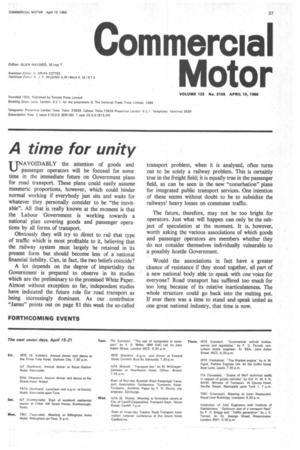A time for unity UN AVOIDABLY the attention of goods and
Page 39

If you've noticed an error in this article please click here to report it so we can fix it.
passenger operators will be focused for some time in the immediate future on Government plans for road transport. These plans could easily assume mesmeric proportions, however, which could hinder normal working if everybody just sits and waits for whatever they personally consider to be "the inevitable". All that is really known at the moment is that the Labour Government is working towards a national plan covering goods and passenger operations by all forms of transport.
Obviously they will try to direct to rail that type of traffic which is most profitable to it, believing that the railway system must largely be retained in its present form but should become less of a national financial liability. Can, in fact, the two beliefs coincide?
A lot depends on the degree of impartiality the Government is prepared to observe in its studies which are the preliminary to the promised White Paper. Almost without exception so far, independent studies have indicated the future role for road transport as being increasingly dominant. As our contributor "Janus" points out on page 81 this week the so-called transport problem, when it is analysed, often turns out to be solely a railway problem. This is certainly true in the freight field; it is equally true in the passenger field, as can be seen in the new "conurbation" plans for integrated public transport services. One intention of these seems without doubt to be to subsidize the railways' heavy losses on commuter traffic.
The future, therefore, may not be too bright for operators. Just what will happen can only be the subject of speculation at the moment. It is, however, worth asking the various associations of which goods and passenger operators are members whether they do not consider themselves individually vulnerable to a possibly hostile Government.
Would the associations in fact have a greater chance of resistance if they stood together, all part of a new national body able to speak with one voice for everyone? Road transport has suffered too much for too long because of its relative inarticulateness. The whole structure could go back into the melting pot. If ever there was a time to staid and speak united as one great national industry, that time is now.








































































































































